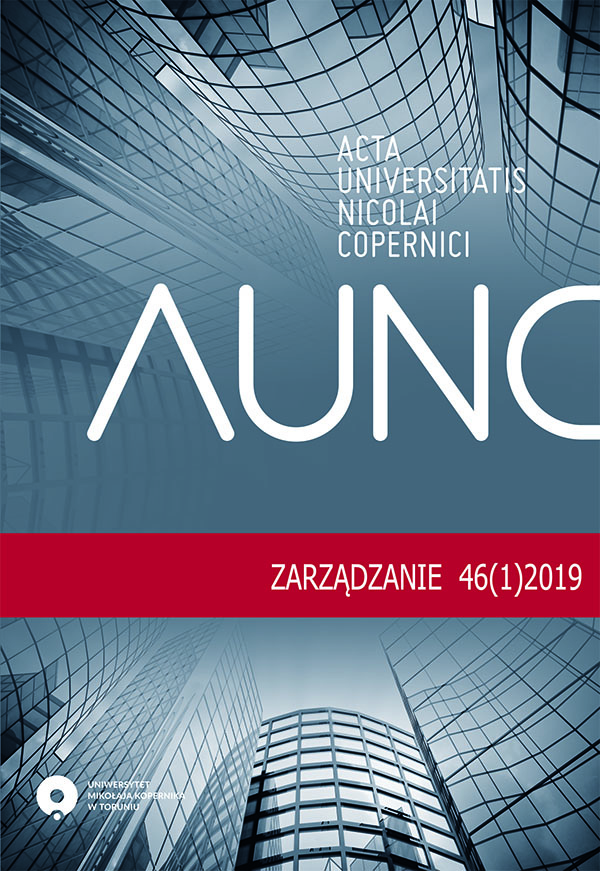CHARACTERISTICS OF SELF-ORGANIZING TEAMS IN AGILE PROJECT MANAGEMENT: A CASE STUDY
DOI:
https://doi.org/10.12775/AUNC_ZARZ.2019.002Keywords
self-organizing teams, agile teams, agile project managementAbstract
Self-organizing teams, especially in the context of Agile Project Management are subject of interest in business and academia. Agile approach has roots in the IT industry and expending to other fields. One of the most dominant attributes of Agile approach is self-organizing teams. In the literature, self-organizing teams have been studied sine 50s of XX century and can be described by six dimensions: autonomy, communication, learning, team orientation, shared leadership and redundancy. Also, self-organizing agile teams can be characterized by existing informal roles like a mentor, coordinator, translator, promoter, champion, terminator. In the article, the author used a case study method for examining the above characteristics of self-organizing teams. As a result, the existing theoretical models can be useful in diagnosing the state of a self-organizing team. Further studies with more strict research methods are recommended to extend knowledge about the self-organizing team in Agile Project Management.References
Beck, K., Beedle, M., van Bennekum, A., Cockburn, A., Cunningham, W., Fowler, M., … Thomas, D. (2001). Manifesto for Agile Software Development. Retrieved February 7, 2019, from https://agilemanifesto.org/
Burns, T. and Stalker, G. (1961). The Management of Innovation. London:Tavistock.
Czakon, W. (red. . (2015). Podstawy metodologii badań w naukach o zarządzaniu. Igarss 2014, (April), 455.
Dingsøyr, T., Nerur, S., Balijepally, V., & Moe, N. B. (2012). A decade of agile methodologies: Towards explaining agile software development. Journal of Systems and Software.
Druskat, V. U., & Wheeler, J. V. (2003). Managing from the boundary: The effective leadership of self-managing work teams. Academy of Management Journal, 46(4), 435–457. 7
Guzzo, R. A., & Dickson, M. W. (1996). TEAMS IN ORGANIZATIONS: Recent Research on Performance and Effectiveness. Annual Review of Psychology, 47(1), 307–338.
Helsinki, H. K., & Karhatsu, H. (2010). Building a Self-organizing Software Development Team: Multiple Case Study.
Hoda, R., & Murugesan, L. K. (2016). Multi-level agile project management challenges: A self-organizing team perspective. Journal of Systems and Software, 117, 245–257.
Hoda, R., Noble, J., & Marshall, S. (2010). Organizing Self-Organizing Teams. Association of Computer Manufacturers Journal.
Langfred, C. W. (2000). The paradox of self‐management: Individual and group autonomy in work groups. Journal of Organizational Behavior, 21, 563.
Moe, N. B., Dingsøyr, T., & Dybå, T. (2010). A teamwork model for understanding an agile team: A case study of a Scrum project. Information and Software Technology, 52(5), 480–491.
Takeuchi, H., & Nonaka, I. (1986). New Product Development Game. Harvard Business Review, 64, 137–146.
Sheffield, J., & Lemétayer, J. (2013). Factors associated with the software development agility of successful projects. International Journal of Project Management, 31(3), 459–472. 1
Serrador, P., & Pinto, J. K. (2015). Does Agile work? - A quantitative analysis of agile project success. International Journal of Project Management.
Takeuchi, H., & Nonaka, I. (1986). New Product Development Game. Harvard Business Review, 64, 137–146.
Wysocki, R. K. (2013). Effective Project Management: Traditional, Agile, Extreme (7th ed.). Wiley Publishing.
Downloads
Published
How to Cite
Issue
Section
Stats
Number of views and downloads: 1856
Number of citations: 0







